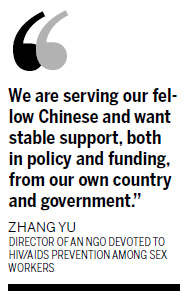Society
Minister assures NGOs after loss of funding
By Shan Juan (China Daily)
Updated: 2011-06-23 07:51
 |
Large Medium Small |
KUNMING - Minister of Health Chen Zhu said he was shocked when he met groups fighting to help people with HIV/AIDS on Tuesday and pledged to do all he can to improve their situation.
He made the remarks at a roundtable meeting attended by the leaders of major Chinese non-governmental organizations (NGOs) from Yunnan, Shaanxi, Sichuan and Guizhou provinces involved in the work to combat HIV/AIDS.
| ||||
Despite the fact that many of the NGOs had been in existence on the mainland for almost two decades, the meeting was the first of its kind to feature such in-depth and candid dialogue between health officials and representatives of the NGOs.
In his opening address ahead of the four-hour session, Chen said honest words from attendees, including harsh criticism, were welcome.
The meeting followed Global Fund, a Geneva-based international organization that provides funding for disease control and prevention work worldwide, suspended grant payments to China. The organization cited poor government support for NGOs and the "unsatisfactory" management of funds as reasons for its decision.
Thomas Cai, who heads AIDS Care China, a Guangzhou-based NGO that provides support to patients and their families, said the sudden loss of funding dealt a heavy blow to grassroots societies.
"More importantly, it will affect the country's overall battle against the epidemic, which doesn't wait for anything," he said. "Also, other overseas organizations might follow suit and stop making donations to China."

Chen said the government is hopeful that Global Fund will resume its support.
"The ministry is in talks with Global Fund and hopes to solve the problems," he said. "I'd like to make the Chinese NGOs' voices heard by overseas organizations."
Global Fund had disbursed $548 million in grants in China since 2003 and had earmarked around $680 million for future funding, mainly to combat HIV/AIDS and TB, according to the ministry. Programs funded by the organization have extended to two-thirds of China's counties and benefited tens of thousands of people.
Antiviral drugs distributed to Chinese patients for free are largely paid for by the fund, according to Meng Lin, a coordinator from the secretariat of the China Alliance of People Living with HIV/AIDS.
Chen said advanced working principles and mechanisms to control the spread of HIV/AIDS brought in by Global Fund, including the way it involves NGOs, have been even more valuable than the funding and those ideas should be continued.
Wang Xiaoguang, deputy director of the NGO Daytop Drug Abuse Treatment and Rehabilitation Center in Kunming, said China now faces the challenge of sustaining the development of NGOs after the loss of funding.
In China, most of the NGOs involved in the fight against HIV/AIDS have been dubbed by experts "Chinese children fed with foreign milk".
Cai said the foreign funding often leads conservatives at the local level to view the NGOs as anti-government forces or as harboring political agendas.
"My organization, which has helped more than 20,000 sufferers, received all of its funding in US dollars from overseas," he said. "Local health authorities were reluctant to share information with us and work with us."
Wang Xiaodong, who heads a Chengdu-based NGO committed to HIV/AIDS intervention among men having sex with men, said such suspicion will not go away unless the NGOs are allowed to register as government-supported organizations.
"Without legal recognition, in other words government registration, these problems will not be solved," Wang said.
He said most NGOs, however, face great difficulties getting registered. Without such registration, he said, the groups cannot qualify for tax exemption and even have trouble opening bank accounts that can accept donations.
Chen Zhu said it would be difficult to relax the rules relating to NGOs on the mainland in the short term but assured attendees that the Ministry of Health will now "try our best to help facilitate their work and future development".
His comments were welcomed by attendees.
"That sounds inspiring and encouraging for us because we have been generally uncertain about a future without foreign donations," said Zhang Yu, director of a US-funded NGO devoted to HIV/AIDS prevention among sex workers.
"We are serving our fellow Chinese and want stable support, both in policy and funding, from our own country and government."
Chen said such support will now flow.
"The government will keep groping for a suitable way to sustain NGOs' involvement and development in the field, helping to enhance their work and purchasing services from them," he said.
"I firmly believe that, even with foreign donations, such groups still have a Chinese heart and should be supported by ourselves, particularly after the withdrawal of foreign funding."
He said the NGOs "play an indispensable role in the national fight against HIV/AIDS led by the government".
For example, of the 1,200 HIV/AIDS cases detected in Beijing last year, about half were found by NGOs, said Chen.
He urged health authorities and disease control and prevention centers, particularly at the local level, to work more closely with such groups and listen to their suggestions.
"That is how public health sectors can build capacity, because they lag behind in terms of staff quality and knowledge as a result of the health sector's previous market orientation that favored large hospitals," Chen noted.
Cai said he felt optimistic about the future, despite the current loss of funding and support from Global Fund, noting that its withdrawal "prompted the government to think more about the emerging force of NGOs and how to manage them in the long run".
| 分享按钮 |



